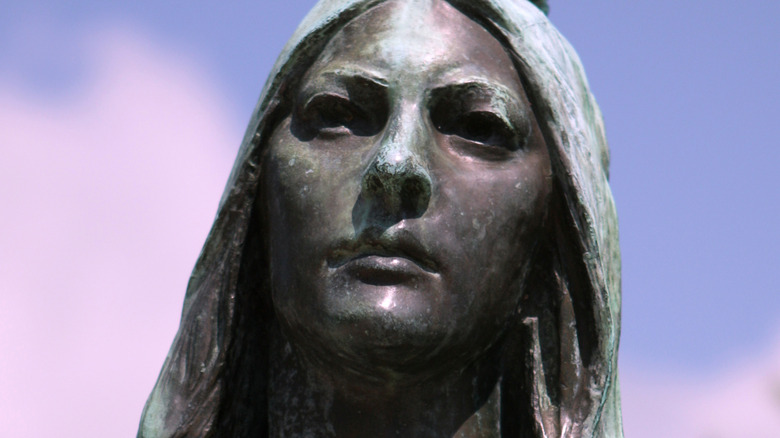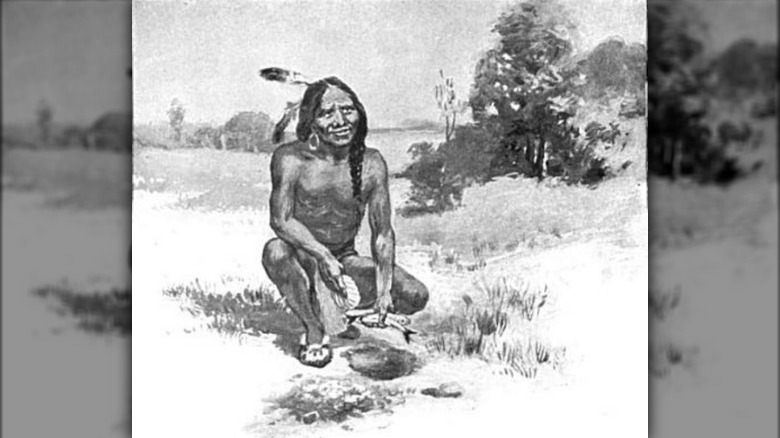The Fabled Meeting Of Two Of The Most Prominent Native Americans In Colonial History
Two of the most notable Native Americans from early North American colonial history, Pocahontas and Squanto, may have met one another while living in London in the 17th century, according to Dr. E. M. Rose, a Visiting Fellow in the Department of History at Harvard University, writing for Early Americanists. As Rose explains, there's no hard proof that Pocahontas (or Amonute in her Powhatan Algonquin dialect), and Squanto (called Tisquantum in his native language, an Alongquin offshoot), ever spent time face-to-face. Circumstantial evidence does suggest that this may have been the case, though, and Rose convincingly lays out how it might have happened.
Pocahontas and Squanto both influenced early American history, a path that led each to the English capital city around the same time. For her part, Pocahontas, so nicknamed for her playful personality, married early English settler, John Rolfe, before the couple returned to England in 1616, where Pocahontas was baptized Rebecca in the Christian church. While in England, Pocahontas and Rolfe had an audience with the king and queen of England, King James I and Queen Anne (per the National Park Service). As for Squanto, he was an abducted member of the Patuxet people turned slave, who arrived in England from Spain, with a connection to Rolfe and Pocahontas via John Smith, the one-time governor of Jamestown (via Britannica).
Pocahontas and Squanto may have lived near one another
Squanto arrived in London via Spain around the same time as Rolfe and Pocahontas, and it's in that three-year period between 1616 and 1619 that Dr. Rose presents her most compelling bits of evidence that Pocahontas and Squanto spent time together, writing for Early Americanists. As Rose notes in her article, Pocahontas likely spent time in the household of Thomas Smythe, a London merchant with several colonial interests including the East India and Virginia Companies. At the very least, Pocahontas, Rolfe, and Smythe certainly moved in similar social circles in London high society. While in London, Squanto lived with John Slaney of the Newfoundland Company.
In addition to the similar industries that both Slaney and Smythe worked in, as well as aspects of both men's lifestyles that are known to intersect, the two early colonial businessmen lived near one another in London — only a few hundred yards apart, in fact. Through that preponderance of evidence, Rose claims that the Pocahontas and Squanto — both connected to men with interests in the Virginia colony — would have at some point met before 1619, when Squanto returned to his homeland, whether that was intentionally in the households of Smythe or Slaney or through some other social circumstance.
Pocahontas and Squanto spoke different dialects
Should Pocahontas and Squanto have been in the same room at the same time with one another, it's fascinating to consider what they may have said. As Dr. Rose goes on to point out in her Early Americanists article, Pocahontas and Squanto spoke different dialects of the Algonquin language with English only as their second language. For this reason, there were likely language barriers to overcome in their speculative conversation, as each understood certain parts of what the other said, but not everything, while in English they both filled in the gaps as best they could.
It is pure supposition what the topic of that conversation may have been, but like anyone who finds themselves across the world from where they were born, they would have more than likely spoken of home, as Rose writes. Speaking with Virginia news outlet, WYDaily Rose said, "I find it fascinating that the person who paid for Pocahontas's trip [to London] and who housed Squanto were both members of the East India Company." Though there's no smoking gun, " ... [I]t's likelihood, not proof ... It's a fantastic fantasy, but not an unlikely one," Rose added. Preparing her return home, Pocahontas died in 1617 in England from an unspecified illness (via NPS). Squanto died in 1622 leading an expedition in North America near Cape Cod (per Britannica).


